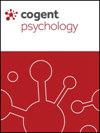Low self-perceived resilience mediates the link between limited access to emotion regulation strategies and non-suicidal self-injury
IF 1.6
Q2 PSYCHOLOGY, MULTIDISCIPLINARY
引用次数: 0
Abstract
Having limited access to effective emotion regulation (ER) strategies, a construct commonly measured using the Difficulties in Emotion Regulation Scale (DERS; Gratz & Roemer, 2004), has been found to be strongly linked with non-suicidal self-injury (NSSI). However, the mechanisms that explain this association need more in-depth exploration. In this study, we investigated whether a cognitive mechanism (low self-perceived resilience) and/or a behavioral mechanism (insufficient repertoire of strategies used to resist NSSI) explained the association between limited access to ER strategies and the likelihood of recent (past-month) NSSI. Research questions were explored in a sample of 922 university students with a lifetime NSSI history (83.3% female). Study variables were measured using self-report questionnaires. Controlling for anxiety/depression, a path analytic model revealed that only low self-perceived resilience mediated the association between limited access to ER strategies and past-month NSSI. Participants who endorsed having limited access to ER strategies unexpectedly reported a higher number of coping strategies to resist NSSI. The results support the relevance of exploring resiliency beliefs in the association between ER capability and NSSI.低自我知觉弹性介导了有限的情绪调节策略与非自杀性自伤之间的联系
由于对有效情绪调节(ER)策略的获取有限,通常使用情绪调节困难量表(DERS;Gratz & Roemer, 2004),已被发现与非自杀性自伤(NSSI)密切相关。然而,解释这种关联的机制需要更深入的探索。在这项研究中,我们调查了认知机制(低自我感知弹性)和/或行为机制(用于抵抗自伤的策略储备不足)是否解释了有限的急诊策略与最近(过去一个月)自伤可能性之间的关联。对922名有自伤史的大学生(83.3%为女性)进行问卷调查。研究变量采用自我报告问卷进行测量。在控制焦虑/抑郁因素后,路径分析模型显示,只有低自我知觉弹性在有限的ER策略获取与过去一个月自伤之间起中介作用。支持有限使用急诊策略的参与者意外地报告了更多的应对策略来抵抗自伤。研究结果支持探索弹性信念与内情能力和自伤之间关系的相关性。
本文章由计算机程序翻译,如有差异,请以英文原文为准。
求助全文
约1分钟内获得全文
求助全文
来源期刊

Cogent Psychology
PSYCHOLOGY, MULTIDISCIPLINARY-
CiteScore
2.90
自引率
0.00%
发文量
75
审稿时长
12 weeks
期刊介绍:
One of the largest multidisciplinary open access journals serving the psychology community, Cogent Psychology provides a home for scientifically sound peer-reviewed research. Part of Taylor & Francis / Routledge, the journal provides authors with fast peer review and publication and, through open access publishing, endeavours to help authors share their knowledge with the world. Cogent Psychology particularly encourages interdisciplinary studies and also accepts replication studies and negative results. Cogent Psychology covers a broad range of topics and welcomes submissions in all areas of psychology, ranging from social psychology to neuroscience, and everything in between. Led by Editor-in-Chief Professor Peter Walla of Webster Private University, Austria, and supported by an expert editorial team from institutions across the globe, Cogent Psychology provides our authors with comprehensive and quality peer review. Rather than accepting manuscripts based on their level of importance or impact, editors assess manuscripts objectively, accepting valid, scientific research with sound rigorous methodology. Article-level metrics let the research speak for itself.
 求助内容:
求助内容: 应助结果提醒方式:
应助结果提醒方式:


